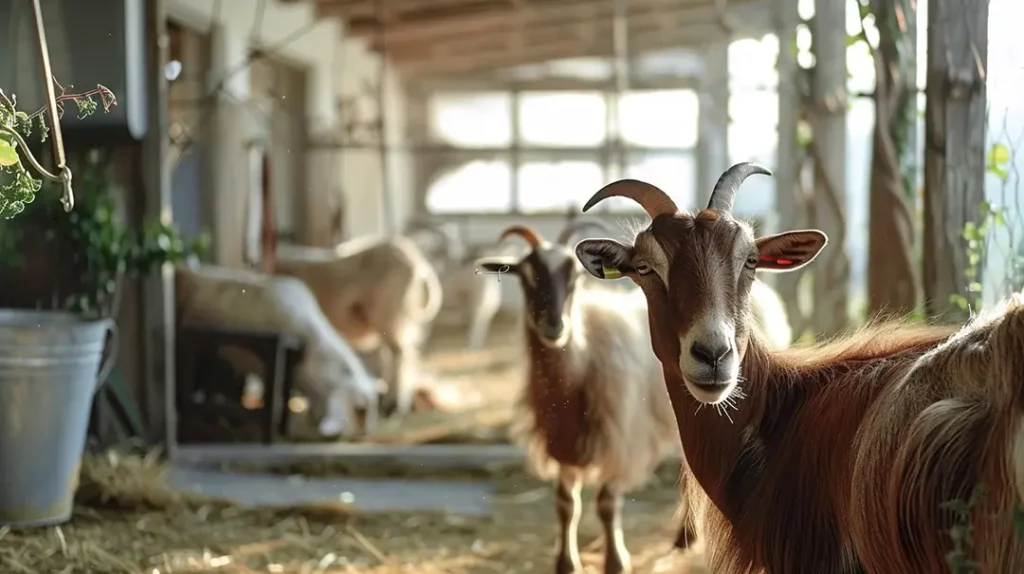
The Mediterranean diet emphasises fresh produce, whole grains, healthy fats, lean proteins, dairy products like goat's milk, and herbs/spices. By combining these diverse ingredients, one can achieve a balanced lifestyle promoting physical and mental well-being. Goat's milk, rich in essential minerals and with anti-inflammatory properties, plays a vital role in this diet, supporting immune function and heart health.
The Mediterranean diet is more than just a way of eating; it embodies a rich culinary tradition that has been passed down through generations. This diet primarily features:
Incorporating diverse ingredients ensures a balanced lifestyle. This dietary approach encourages consuming a variety of foods to gain essential nutrients. By combining different food groups, one can achieve an optimal balance of vitamins, minerals, and antioxidants.
The Mediterranean diet also places importance on moderation and mindfulness, promoting not just physical health but also mental well-being. This holistic approach to eating supports longevity and reduces the risk of chronic diseases. Goat farming plays a significant role in this diet by providing high-quality dairy products that are both nutritious and flavourful.
Adopting these principles into daily meals can lead to a healthier lifestyle that mirrors the vitality found in Mediterranean regions.
Goat’s milk stands out in the Mediterranean diet for several compelling reasons:
Incorporating Mediterranean goat’s milk into your diet can greatly benefit your overall well-being. Its mineral richness, digestibility, anti-inflammatory effects, and antioxidant benefits make it an excellent addition to the Mediterranean lifestyle. Regular consumption of goat milk production products has been associated with various health benefits, including a lower risk of heart disease.
Adding goat’s milk to your Mediterranean diet can be a delicious way to enhance your nutrition while supporting your heart health.

Goat cheese, known for its unique taste and versatility, is an essential ingredient in both traditional and contemporary Mediterranean dishes. Its creamy and tangy flavour makes it perfect for enhancing a wide range of goat cheese recipes that are Mediterranean diet-friendly.
Goat cheese is a key component in classic dishes such as:
In modern cuisine, goat cheese can be found in great pizzas, artisanal flatbreads, and even desserts like cheesecake. These dishes not only delight the palate but also align with nutritious eating principles, making them ideal for those seeking Mediterranean diet-friendly recipes.
The creamy texture of goat cheese pairs wonderfully with its tangy flavours, which can vary from mild to sharp. This combination adds depth and complexity to dishes, whether it’s melted over grilled vegetables or served fresh with olive oil.
Goat cheese is a staple in Mediterranean mezze platters, where it can be:
Its ability to complement ingredients like olives, sun-dried tomatoes, and roasted red peppers showcases its versatility.
Different types of goat cheeses are celebrated throughout the Mediterranean, each offering distinct flavours and textures influenced by local cheese-making traditions.
Feta is perhaps the most famous Mediterranean goat cheese, primarily produced in Greece. It has a crumbly texture and salty taste. Traditionally made from sheep’s milk or a mix of sheep’s and goat’s milk, feta is a key ingredient in many Greek dishes like spanakopita (spinach pie) and horiatiki salad (Greek village salad).
Chèvre originates from France but is enjoyed all over the Mediterranean. It refers to various kinds of fresh goat cheeses that are usually soft and moist with a tangy flavour that can differ based on the region and aging process. Chèvre is often eaten plain or rolled in herbs and spices for extra flavour.
Each Mediterranean country has its own unique goat cheese varieties:
Goat cheese’s versatility not only enhances culinary diversity but also brings nutritional benefits to various dishes across the Mediterranean region. Whether used as the main ingredient or to elevate other components within meals, its presence plays an important role in shaping authentic Mediterranean cuisine.

Goat farming, an integral part of Mediterranean agriculture, has roots that stretch back thousands of years. Historically, pastoral farming was the backbone of many rural communities, providing not just sustenance but also a means to trade and economic stability. The hardy nature of goats made them ideal for the rugged Mediterranean landscapes, where other livestock might struggle.
Mediterranean goat’s milk has been a staple in local diets and is renowned for its nutritional benefits. Goat milk production continues to play a crucial role in dairy farming within the region, supporting both traditional practices and modern agricultural methods.
One of the standout features of goat farming is the adaptability of goats to challenging terrains. These animals thrive in environments that are often unsuitable for cattle or other livestock. Their ability to graze on sparse vegetation allows them to support rural economies by utilising otherwise unproductive land. This adaptability plays a crucial role in maintaining food security, particularly in economically disadvantaged areas where agricultural options may be limited.
The economic contributions of goat farming extend beyond mere subsistence. Current statistics highlight a significant presence of goats compared to cattle in various Mediterranean regions. For instance:
This prevalence reflects not only cultural preferences but also economic pragmatism. Goat milk production has seen consistent growth, driven by increasing demand for its nutritional benefits and unique flavour profile.
In economically disadvantaged areas, goat farming contributes significantly to food security. Goats provide a reliable source of milk and meat, essential for nutrition. Additionally, they offer economic opportunities through the sale of dairy products like cheese and yoghurt. This dual role as both food source and income generator underscores the importance of goats in sustaining local economies.
Recent trends indicate a rise in goat milk production across the Mediterranean region. This growth is supported by several factors:
These elements combine to create a positive outlook for the future of goat farming in the Mediterranean. As demand continues to rise, so does the potential for economic development and improved food security in rural areas.
Goat farming’s blend of historical significance, adaptability, and economic impact ensures its continued relevance in Mediterranean agriculture. Its contributions to local economies and food security highlight its importance not just as a tradition but as a vital component of contemporary agricultural practices.
Goat’s milk aligns perfectly with health-conscious eating patterns that define the Mediterranean diet. Rich in essential nutrients and easier to digest, it offers numerous advantages over cow’s milk, making it a staple in Mediterranean goat’s milk products.
Incorporating goat’s milk into your diet can be as simple as replacing cow’s milk with goat’s milk in everyday recipes. Whether it’s in your morning cereal, a smoothie, or even baked goods, this switch supports a health-conscious lifestyle. Explore various goat cheese recipes to further enrich your nutritious eating habits with the diverse flavours of goat cheeses. These Mediterranean diet-friendly recipes not only taste great but also offer numerous health benefits associated with the Mediterranean diet, such as a lower risk of heart disease.
By embracing goat cheese making and integrating these products into your meals, you can enjoy a delicious and nutritious way to adhere to a Mediterranean diet.
Future trends in goat dairy products highlight their emerging role in sustainable agriculture. Increased awareness of the health benefits and nutritional superiority of goat’s milk drives demand, promoting innovative farming practices that support environmental sustainability.
Goat’s milk is becoming a staple in health-conscious diets, offering an alternative to cow’s milk with its lower fat content and cholesterol levels. By integrating goat’s milk into daily meals, individuals can enjoy a range of culinary delights while reaping significant health advantages.
Embracing goat’s milk not only enhances personal well-being but also contributes to broader agricultural sustainability. Its adaptability ensures food security and economic stability in rural areas, making it a keystone in both traditional and modern Mediterranean diets.
Exploring the diversity of goat dairy products provides opportunities for culinary creativity, enriching the Mediterranean diet with flavoursome and nutritious options.

At Med.kitchen, our passion lies in crafting exceptional culinary experiences through our online platform. We specialise in sharing a wealth of knowledge via articles, recipes, courses, and online mentoring, aiming to inspire both novice and seasoned chefs alike. Our focus has shifted from private dining to being an online source of gastronomic inspiration, allowing you to explore and refine your culinary skills from the comfort of your home..